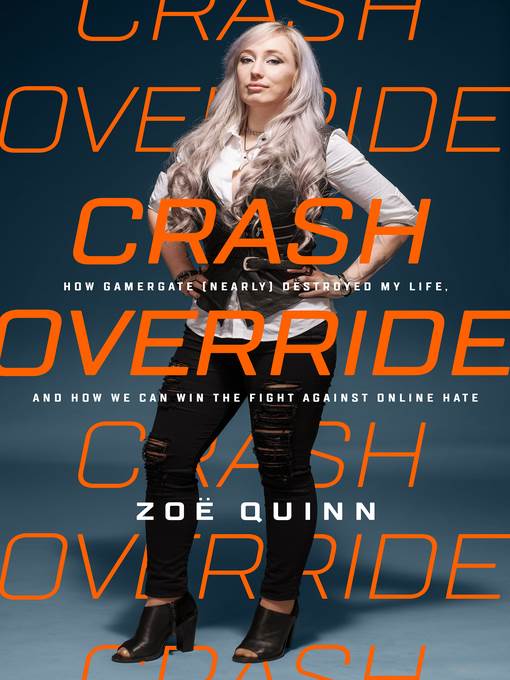
Crash Override
How Gamergate (Nearly) Destroyed My Life, and How We Can Win the Fight Against Online Hate
- اطلاعات
- نقد و بررسی
- دیدگاه کاربران
نقد و بررسی

Starred review from July 24, 2017
In 2014, indie game developer Quinn became the target of death threats, hate mail, and other online abuse after an internet vendetta devised by her abusive ex-boyfriend spiraled into a harassment campaign that came to be known as Gamergate, in which several women in the video game industry become the targets of largescale, coordinated online abuse. Quinn uses her personal experiences to advocate practical steps toward creating a safe and open internet culture. She rejects tired advice such as “don’t feed the trolls” and “just go offline,” instead advising social media users to secure passwords and to keep active records of any incidents of abuse and contact law enforcement. She calls on readers to resist the temptation toward vigilante justice. Instead of using the same tactics as the internet trolls, which just feeds the online outrage culture, Quinn encourages readers to focus their efforts on restorative justice by seeking out perspectives of people—particularly voices of trans women and women of color who are often targets of online abuse. For Quinn, winning the “cultural battle for the web” starts with reframing the issue as not a matter of good vs. bad people fueling hate culture on the internet, but rather “acceptable and unacceptable ways to treat each other.” It’s a remarkably clear-eyed view that’s all the more powerful in light of Quinn’s backstory.

July 1, 2017
A video game developer tells how she became an outspoken advocate for victims of online abuse.In August 2014, the life Quinn had built after "clawing my way out of poverty, homelessness, isolation, and mental illness" changed forever. An abusive ex-lover had decided to take revenge by posting hateful messages about her on video game forums. One post included a link to a 9,000-word "manifesto" that claimed Quinn had slept with video game evaluators to receive favorable reviews. A few months later, she found herself at the center of a cultural storm that came to be known as GamerGate. Hackers sympathetic to her ex hounded Quinn's past associates. Online, they posted nude photos and "discussions about how to drive me to suicide and the merits of raping me versus torturing me first and raping me afterwards." The author began keeping her whereabouts secret because she felt as unsafe in her virtual life as she did in her real one. Refusing to be cowed into silence, she attempted to seek justice only to find that the "legal system [was] ill-equipped to handle the idea that anything real happens on the internet. In response, she founded an online abuse crisis hotline and victims' advocacy group, which she named Crash Override Network. Quinn's book is strongest in the detailed information she provides about the many--mostly underdiscussed--legal and corporate bottlenecks she encountered as both a victim and investigator of malicious cyberattacks. One especially disturbing observation she makes is that typical victims come from sexually and racially marginalized groups that law enforcement "[has] a history of mistreating." Her story, which mingles details from her personal and professional lives along with hard-won tips for online safety, sometimes comes across as scattered. Nevertheless, the narrative is still a worthwhile read for anyone interested in taking action against the realities--and devastating effects--of extreme internet trolling. Not without flaws but an informative and inspiring book.
COPYRIGHT(2017) Kirkus Reviews, ALL RIGHTS RESERVED.

June 15, 2017
Part memoir, part social movement manifesto, this engrossing journey by game designer Quinn takes readers into the darkest realms of social media and the Internet. First, Quinn recounts her personal experience as the original target of the online harassment campaign known as Gamergate. She then provides practical advice for both preventing and responding to online attacks, an insider's view gained from her lived experiences and from assisting others via Crash Override, her online abuse crisis resource network. This book is a shocking account of the extent of online hate in some corners of the Internet, and the disastrous effects that online harassment can have on the target's personal and professional life. It also provides a distressing overview of how quickly the negativity can spread via social media to supporters, colleagues, family and friends. Quinn's story provides useful lessons for all social media users and offers a window into broader sociological issues related to gender, inclusion, and regulation of online communication. VERDICT An important purchase that will interest social media users and enlighten them about the extent of online hate in some social platforms and the limits on personal and social protections available in society today.--William Varick, Plain City, OH
Copyright 2017 Library Journal, LLC Used with permission.

August 1, 2017
Quinn discovered video games as a child and loved them immediately. As a young adult, she learned to code and became well-known for creating unique games, such as Depression Quest. In 2014, Quinn broke up with an abusive boyfriend, who reacted by posting a manifesto online, accusing her of various crimes and infidelity and encouraging others to attack her. Anonymous men began hacking her accounts, sharing her personal information, and threatening Quinn, her friends, and family. The harassment continued for years, and Quinn feared for her personal safety. The incident started a movement known as #gamergate, a focused campaign of hate primarily directed at women, people of color, and other marginalized groups. Crash Override is a memoir of Quinn's traumatic experience and her creation of a nonprofit to help protect others online as well as an exploration of online abuse and strategies to combat it. She elevates diverse voices in her engaging, often-humorous writing. Whether readers are Internet devotees or not, Quinn's writing provides important context for our increasingly online lives.(Reprinted with permission of Booklist, copyright 2017, American Library Association.)




دیدگاه کاربران